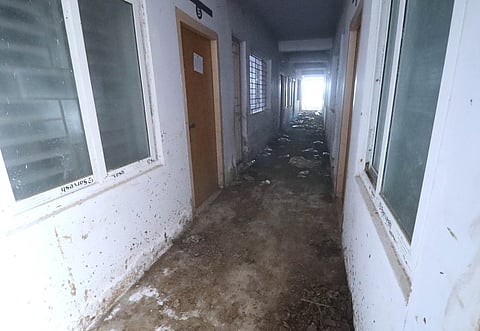

MADURAI: Crumbling walls, overgrown bushes and stagnant water; elements that are characteristic not just to abandoned houses, but also to the multi-storeyed residential apartments constructed by the Tamil Nadu Urban Housing Development Board (TNUHDB) at Rajakoor near Madurai.
With a lack of adequate facilities and poor infrastructure, there are few takers for these flats. In the first phase, 1,566 flats were built nearly a decade ago under the Jawaharlal Nehru National Urban Renewal Mission (JNNURM) for Rs 47.75 crore.
Located in Rajakoor’s Periyar Nagar, a good 18 km away from Madurai city limits, these tenements with over 2,000 flats built in three phases have little to offer for the residents - no access to transport, healthcare or education facilities. In 2017-18, 1,088 houses were constructed for Rs 89.75 crore in phase II, while 512 houses were constructed in phase III for Rs 50.18 crore in 2022-23.
TNIE visited the tenements and spoke with the residents, mostly conservancy workers who depend on work in the city. Kalidas (36) told TNIE, “While I am happy that I was allotted a house after paying just Rs 17,500, there are many practical difficulties staying here. I work at the Government Rajaji Hospital in Madurai as a cleanliness worker, and a few of my colleagues were allotted houses here.
However, due to a lack of facilities, many do not prefer to stay here. I had to get my house repaired when I moved in. The roof of the 16th block in the phase II tenement may collapse at any moment. We often see poisonous insects and snakes crossing the pathways in the evenings.”
T Banumathi, another resident said, “I work as a conservatory worker at GRH. Just one bus is available at Rajakoor bus stand at 5.30 am to reach GRH. I must walk 2 km to reach the bus stand and catch the bus, spending an average of Rs 100 for transport. The government officials must visit, and if possible, stay here so they can understand the difficulties we face. In case of any medical emergency, we find it extremely difficult to avail transport.”
Speaking to TNIE, Vanessa Peter, founder, Information and Resource Centre for the Deprived Urban Communities (IRCDUC) said the Madurai district administration should immediately convene the District Habitat Committee, along with the TNUHDB and provide basic services at the resettlement site. Quarterly grievance redressal meetings should be conducted on-site to address the concerns of the resettled families.
Social activist V Ramachandran told TNIE, “Easy access must be given to women and children. Have the quality audit agencies been appointed properly? While resident welfare associations (RWAs) were created to maintain the tenements, they are non-functional. TNUHDB is taking three years to allot the houses; it must be reduced to three months.”
A TNUHDB official, on the condition of anonymity, said, “Tenders have been floated to lay road, and road facilities will be made available within four months. We will visit the tenements and carry out all essential work. As per norms, the beneficiaries must pay Rs 270 as maintenance fee to the RWA, and the same amount will be released by us for maintenance. As most beneficiaries do not reside here, they do not pay.”